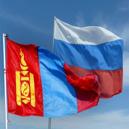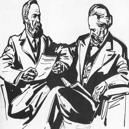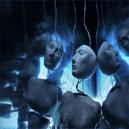Охарактеризованы основное содержание книги «Маркс после Маркса: постсоветская школа критического марксизма и её друзья» (М.: УРСС, 2018, под редакцией А. В. Бузгалина и М. И. Воейкова) и основные отличительные черты постсоветской школы критического марксизма. Показано, что и в XXI в. марксизм нужен тому, кто готов содействовать процессу социального освобождения: содействовать превращению конкуренции в солидарность, эксплуатации – в сотрудничество, неравенства – в справедливость, порабощения (не только властью, но и вещами, деньгами, патриархальностью, верой в доброго царя) – в свободу. Обосновано, кому в мире и в России принадлежит реальная экономико-политическая власть, что есть человек в его социально-экономическом бытии, как можно соединить экономическую эффективность с социальной справедливостью, и что они такое.
The future of Marxism and the Marxism of the future
The article gives a description of the main content of the book “Marx after Marx: The Post-Soviet School of Critical Marxism and Its Friends” (Moscow, 2018, edited by A. Buzgalin and M. Voeikov) and the main distinctive features of the post-Soviet school of critical Marxism. The author shows that in the 21st century Marxism is also necessary for those who are more or less ready to contribute to the process of social emancipation and disalienation: to promote the transformation of competition into solidarity, exploitation into cooperation, inequality into justice, enslavement (not only of power but also of things, money, patriarchy, faith in a good king, etc.) – into freedom. Modern Marxism allows us to show the historical limits of capitalism, to answer questions about who in the world and in Russia owns a real economic and political power, what is the Human Being in its social and economic life, how to combine economic efficiency with social justice, and what they are.
 Ранний опыт государственного строительства большевиков и Конституция РСФСР 1918 года
Ранний опыт государственного строительства большевиков и Конституция РСФСР 1918 года
 7
7
 25534
|
Официальные извинения
25534
|
Официальные извинения
 972
972
 106432
|
Становление корпоративизма в современной России. Угрозы и возможности
106432
|
Становление корпоративизма в современной России. Угрозы и возможности
 239
239
 85324
85324










